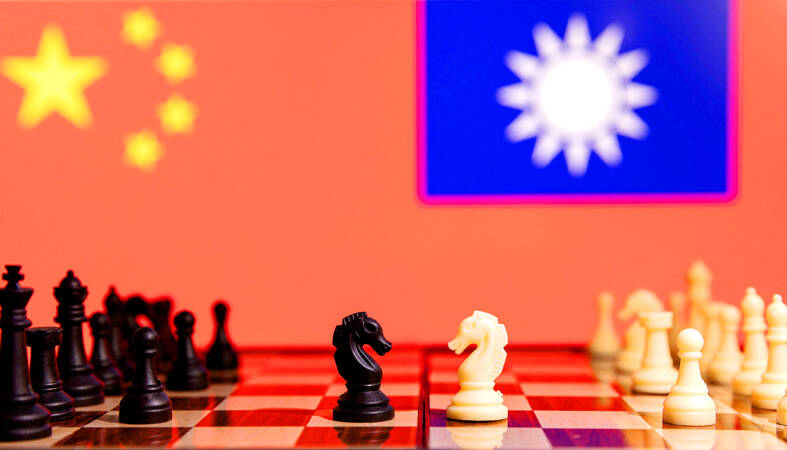China is likely to continue using economic and cyberoperations against Taiwan to force it to capitulate without resorting to a military attack, Fox News reported yesterday, citing the outcome of a tabletop exercise.
Washington-based think tank the Foundation for Defense of Democracies (FDD) earlier this month held a tabletop exercise in Taipei focusing on Beijing’s use of economic and cybercoercion against Taiwan.
The FDD mentioned an “anaconda strategy,” in which Beijing would likely use cyberwarfare and disinformation campaigns followed by a blockade or other measures to strangulate Taiwan, rather than attempting an invasion, the report said.

Photo: Reuters
A large-scale cyberattack would be far costlier to defend against than to launch, thereby giving China the advantage, it said.
“This asymmetry allows China to exert considerable pressure on Taiwan without triggering a direct US military response,” it said, adding that China would use covert cyberwarfare operations that provide it with “just enough cover to maintain plausible deniability.”
Former US Navy rear admiral Mark Montgomery, senior director of the FDD’s Center on Cyber and Technology Innovation, said in an online interview Taiwan faces severe challenges in sustaining its economy in the event of an attack on its critical infrastructure by China.
“How do you keep things going during a series of interlaced critical infrastructure failures, where electrical power drives a problem with financial services, things like that?” he asked.
In addition to cyberattacks, China might also attempt to affect the morale of Taiwanese by spreading misinformation, the report suggested.
In the report, researcher Dean Karalekas said that while Russia’s invasion of Ukraine has spurred preparation in Taiwan, that preparation might not be particularly useful.
Rather than kinetic warfare such as the one in Ukraine, Taiwan was more likely to face being cut off from its supplies of energy, food and other imports, he said.
The FDD said that Taiwan’s reserve troops are poorly trained and lack sufficient equipment to effectively support the regular army in wartime.
Taiwan is also highly dependent on imported liquefied natural gas and has limited energy reserves, it said.
“Once key routes are blocked, it may fall into an energy shortage crisis, and although Taiwan actively develops green energy such as wind power generation, these facilities can easily become targets of enemy attacks during wartime, making it difficult to provide a stable power supply,” it said.
The team recommended that Taiwan actively demonstrate to the international community its determination to defend itself and resolve through specific actions, including increasing its defense budget, strengthening reserve force training and diversifying energy sources.

‘DENIAL DEFENSE’: The US would increase its military presence with uncrewed ships, and submarines, while boosting defense in the Indo-Pacific, a Pete Hegseth memo said The US is reorienting its military strategy to focus primarily on deterring a potential Chinese invasion of Taiwan, a memo signed by US Secretary of Defense Pete Hegseth showed. The memo also called on Taiwan to increase its defense spending. The document, known as the “Interim National Defense Strategic Guidance,” was distributed this month and detailed the national defense plans of US President Donald Trump’s administration, an article in the Washington Post said on Saturday. It outlines how the US can prepare for a potential war with China and defend itself from threats in the “near abroad,” including Greenland and the Panama

A wild live dugong was found in Taiwan for the first time in 88 years, after it was accidentally caught by a fisher’s net on Tuesday in Yilan County’s Fenniaolin (粉鳥林). This is the first sighting of the species in Taiwan since 1937, having already been considered “extinct” in the country and considered as “vulnerable” by the International Union for Conservation of Nature. A fisher surnamed Chen (陳) went to Fenniaolin to collect the fish in his netting, but instead caught a 3m long, 500kg dugong. The fisher released the animal back into the wild, not realizing it was an endangered species at

The High Prosecutors’ Office yesterday withdrew an appeal against the acquittal of a former bank manager 22 years after his death, marking Taiwan’s first instance of prosecutors rendering posthumous justice to a wrongfully convicted defendant. Chu Ching-en (諸慶恩) — formerly a manager at the Taipei branch of BNP Paribas — was in 1999 accused by Weng Mao-chung (翁茂鍾), then-president of Chia Her Industrial Co, of forging a request for a fixed deposit of US$10 million by I-Hwa Industrial Co, a subsidiary of Chia Her, which was used as collateral. Chu was ruled not guilty in the first trial, but was found guilty

The Chinese Nationalist Party (KMT) is maintaining close ties with Beijing, the Democratic Progressive Party (DPP) said yesterday, hours after a new round of Chinese military drills in the Taiwan Strait began. Political parties in a democracy have a responsibility to be loyal to the nation and defend its sovereignty, DPP spokesman Justin Wu (吳崢) told a news conference in Taipei. His comments came hours after Beijing announced via Chinese state media that the Chinese People’s Liberation Army’s Eastern Theater Command was holding large-scale drills simulating a multi-pronged attack on Taiwan. Contrary to the KMT’s claims that it is staunchly anti-communist, KMT Deputy